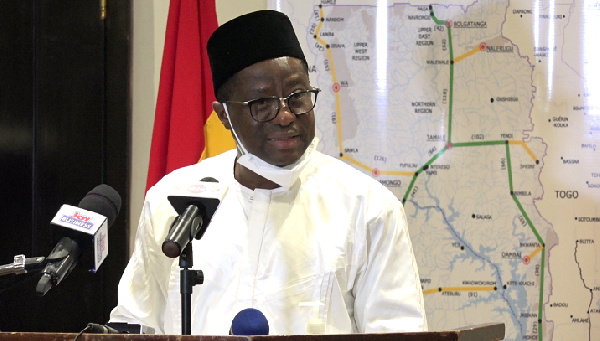

Information, Communication and Technology (ICT) has a high potential to boost markets for farmers, if more efforts are put into addressing the problems, they encounter each year.
What is the basis?
Just as social media can be used for anything, ICT is important for the farmer. Come to think of it, its use by stakeholders in agribusiness in the current telecommunications superhighway could boost production and enhance market linkages.
Perennial challenges
As it is, one can confidently say that the effort of Ghana in leveraging ICT to modernize agriculture is still farfetched.
Farmers, in a continuous cycle, meet challenges of weather pattern, worm infestations on their farms, seeds issues, low markets, post- harvest losses and in the midst of all these problems, they still depend on trial methods to find solutions to their problems.
With the advent of information communication and technology and the use of mobile phones in rural communities, its application in everyday life on people in rural areas has helped to break them from shackles of ignorance.
However, farmers are yet to contend with use of ICTs as means for gaining opportunities for improving agribusiness, economic growth and reduction of poverty.
Agriculture still remains the backbone of Ghana’s economy and provides jobs for men and women especially in the rural communities, where about 82.5 per cent of households are engaged in subsistence farming.
The role agriculture plays in Ghana and its huge potential, calls for more improved ways of communication, both institutionally and at the grassroots level, to help improve and also reduce the numerous bottlenecks in production and marketing.
Meanwhile challenges of inadequate extension staff to provide support to farmers, force some of them to use trial and error methods, especially in the use of pesticides and chemical fertilizer, which can lead to depletion of soil fertility and low productivity.
The ratio of farmers to extension officers in communities is low as most farmers are not experiencing the full compliments of extension services, where they can receive timely services to improve productivity.
Other farmers lose so much of their harvest before they are transported to the markets.
Agricultural Policies
From the 1960s till date, a lot of agricultural policies have been implemented by various governments without considering the role of ICTs.
Though current Government’s Planting for food and jobs(PFJs) and Rearing for Food and Jobs(RFJs) policy promises easy access to farm inputs such as fertilizer, seeds and extension services to increase production and assurance of more job avenues in the agriculture value chain, there is still need to enhance productivity, enrich the farmer and improve food security.
Crowding for chemicals
Recent reports of over-crowding at agro- chemical shops and offices of input sellers to access farm inputs such as seeds and fertilizer could also be avoided if there was a proper way of disseminating information to the farmer.
When a farmers’ data base is properly attainable on a software, passing same information on when and how fertilizer and other services can be obtained reduces time and efforts spent in searching for the items and removes bureaucracy that plunge the farmer into buying products at high cost, inflated by the agents.
What is E –Agriculture?
Even though Government through the Ministry of Food and Agriculture (MoFA) has made efforts at modernising agriculture with E- agriculture as an important component for efficient dissemination of information and related resources, there is the urgent need to speed up efforts to make this a reality.
Until then intervention efforts to the farmer in the area of ICT, which is needed to give impetus to the farmers to champion their own farming activities in a holistic manner, will still be inadequate and therefore access to information regarding farmers’ day to day activities in the area of planting, harvesting and marketing of farm produce will remain a daily challenge.
Some of the problems of the farmers is their inability to coordinate the sales of their crops after harvest, hence market agents continue to take undue advantage to decide prices for them.
The adoption of ICT in agriculture for enhancement of activities of farmers seems to be a mirage as many players’ commonest way of accessing agribusiness information is through interpersonal communication, within their traditional settings and friends outside their communities.
In terms of finding markets, they continue to depend on same channels to help figure out where they can have access to markets for their produce among others.
However, by use of ICTs farmers can be assisted to get information.
E- Agriculture is therefore very critical if the Sustainable Development Goal two of achieving zero hunger by 2030 is to be achieved.
Concerns
The ineffectiveness of E-agriculture is a worry and attributed to the fact that its implementation system relies on an infrastructure whose facilities are not available to the farmers or accessible where they most have become defunct and almost gathering dust.
The components of the infrastructure according to experts is a portal, a call centre, a toll-free voice response system that allows farmers to access important messages, alerts, or listen into a radio programme segments and also make inputs.
These resources are conspicuously defunct in the central cities and towns in the country, where they were initially installed, especially in the Accra and Kumasi MoFA Directorates.
Mr Zimi Alhassan, the Regional Officer in charge of Extension Services at the Upper Regional MOFA Directorate in an interview with indicated that E –agriculture in Ghana was supervised by the West African Agriculture Programme (WAAP) with the support of World Bank.
According to him, the only E-agricultural infrastructure was located in the Northern Regional Capital of MOFA directorate with a functional call centre, which provided prompts in ten Ghanaian Languages for farmers and other players in the value chain.
However, a major challenge that confronts the industry accessibility of facilities by farmers and whether farmers had knowledge of them.
Mr Francis Ennor, the Upper East Regional Director of MoFA, who spoke in an interview in Bolgatanga, reiterated the significance of E –agriculture and the fact that all information and data of farm inputs can be uploaded for stakeholders.
He said though the installation of such infrastructure came with a cost, the Upper East region was yet to collate electronic data of farmers in the region though he did not hide from the fact that high illiteracy rates of farmers was also a challenge in assessing information and using the software.
He said the extension farmer coverage was also a challenge considering the number of farmers to deal with and indicated that the portal served as an innovation for farmers and for staff in getting needed information.
Mr Joshua Diedong, the Officer in charge of crops at the Regional Directorate, said though farmers were sensitized, there was the need for continuous advocacy to achieve the import of E-agriculture in Ghana.
He said Esoko Ghana was one of the popular platforms farmers could share information related to goods and services and blamed illiteracy rates of farmers and stressed that “the era we are now, farmers cannot operate it without E- agriculture.
Recommendations
Currently the significance in the development of Agricultural Commodity Exchanges (ACE) and warehouse Receipt systems (WRS) in Ghana being spear- headed by government and the private sector is yielding good results for stakeholders in agriculture in the country.
Though farmers are taking advantage of the opportunities, they must as well be supported in adopting cell phone technologies, simplified enough to help them address needs especially with accurate information on accessibility to markets.
The implementation of E-agriculture will therefore improve access to cultivation and promote best practices if the farmers receive the support not only on fertilizer subsidies, but improved education through extension services and better ICT infrastructure.
To achieve this, Ghana needs to direct energies into developing the agricultural sector to promote an efficient and well managed E- agriculture programme, which will not only focus on crops, but other areas of agriculture such as livestock and vegetables production.
There is the need for policy makers to re-strategize and implement the good ideas rolled out especially under the PFJs and RFJs and political will of government is key in championing the path for a more holistic intervention in E agriculture just like India, Kenya , Namibia and elsewhere in most developed countries, where E- agriculture played a critical role for farmers to press a knob of a button to be able to access information.
Source: ghanaweb.com






